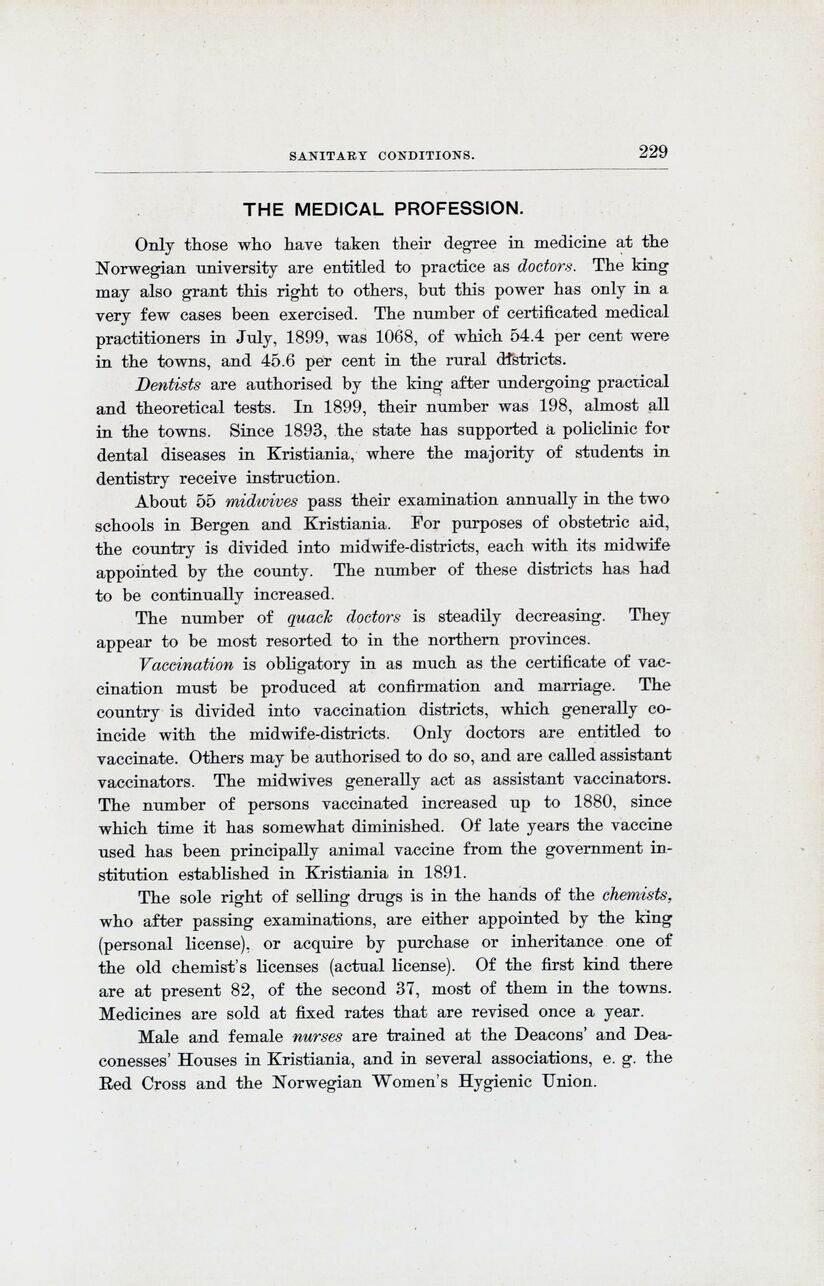
Full resolution (JPEG)
- On this page / på denna sida
- Sanitary Conditions, by Wilhelm Hiorth

<< prev. page << föreg. sida << >> nästa sida >> next page >>
Below is the raw OCR text
from the above scanned image.
Do you see an error? Proofread the page now!
Här nedan syns maskintolkade texten från faksimilbilden ovan.
Ser du något fel? Korrekturläs sidan nu!
This page has been proofread at least once.
(diff)
(history)
Denna sida har korrekturlästs minst en gång.
(skillnad)
(historik)
THE MEDICAL PROFESSION.
Only those who have taken their degree in medicine at the
Norwegian university are entitled to practice as doctors. The king
may also grant this right to others, but this power has only in a
very few cases been exercised. The number of certificated medical
practitioners in July, 1899, was 1068, of which 54.4 per cent were
in the towns, and 45.6 per cent in the rural districts.
Dentists are authorised by the king after undergoing practical
and theoretical tests. In 1899, their number was 198, almost all
in the towns. Since 1893, the state has supported a policlinic for
dental diseases in Kristiania, where the majority of students in
dentistry receive instruction.
About 55 midwives pass their examination annually in the two
schools in Bergen and Kristiania. For purposes of obstetric aid,
the country is divided into midwife-districts, each with its midwife
appointed by the county. The number of these districts has had
to be continually increased.
The number of quack doctors is steadily decreasing. They
appear to be most resorted to in the northern provinces.
Vaccination is obligatory in as much as the certificate of
vaccination must be produced at confirmation and marriage. The
country is divided into vaccination districts, which generally
coincide with the midwife-districts. Only doctors are entitled to
vaccinate. Others may be authorised to do so, and are called assistant
vaccinators. The midwives generally act as assistant vaccinators.
The number of persons vaccinated increased up to 1880, since
which time it has somewhat diminished. Of late years the vaccine
used has been principally animal vaccine from the government
institution established in Kristiania in 1891.
The sole right of selling drugs is in the hands of the chemists,
who after passing examinations, are either appointed by the king
(personal license), or acquire by purchase or inheritance one of
the old chemist’s licenses (actual license). Of the first kind there
are at present 82, of the second 37, most of them in the towns.
Medicines are sold at fixed rates that are revised once a year.
Male and female nurses are trained at the Deacons’ and
Deaconesses’ Houses in Kristiania, and in several associations, e. g. the
Red Cross and the Norwegian Women’s Hygienic Union.
<< prev. page << föreg. sida << >> nästa sida >> next page >>
Project Runeberg, Sun Dec 10 21:09:24 2023
(aronsson)
(diff)
(history)
(download)
<< Previous
Next >>
https://runeberg.org/norparis/0241.html



